Table of Contents
Do you suffer from knee pain or inelastic skin? Maybe you should consider collagen supplementation. Don’t know how to do it? Here are some guaranteed tips on how to take more collagen effectively, but especially comfortably.
What is collagen?
Collagen is a general term for a certain type of structural protein that is found in the skin and connective tissues of both animals and humans. This type of protein makes up about 30% of the total protein in the body. It is also exceptional for the fact that it contains up to 19 amino acids, including glycine, proline, lysine and arginine. [1] [3] [6]
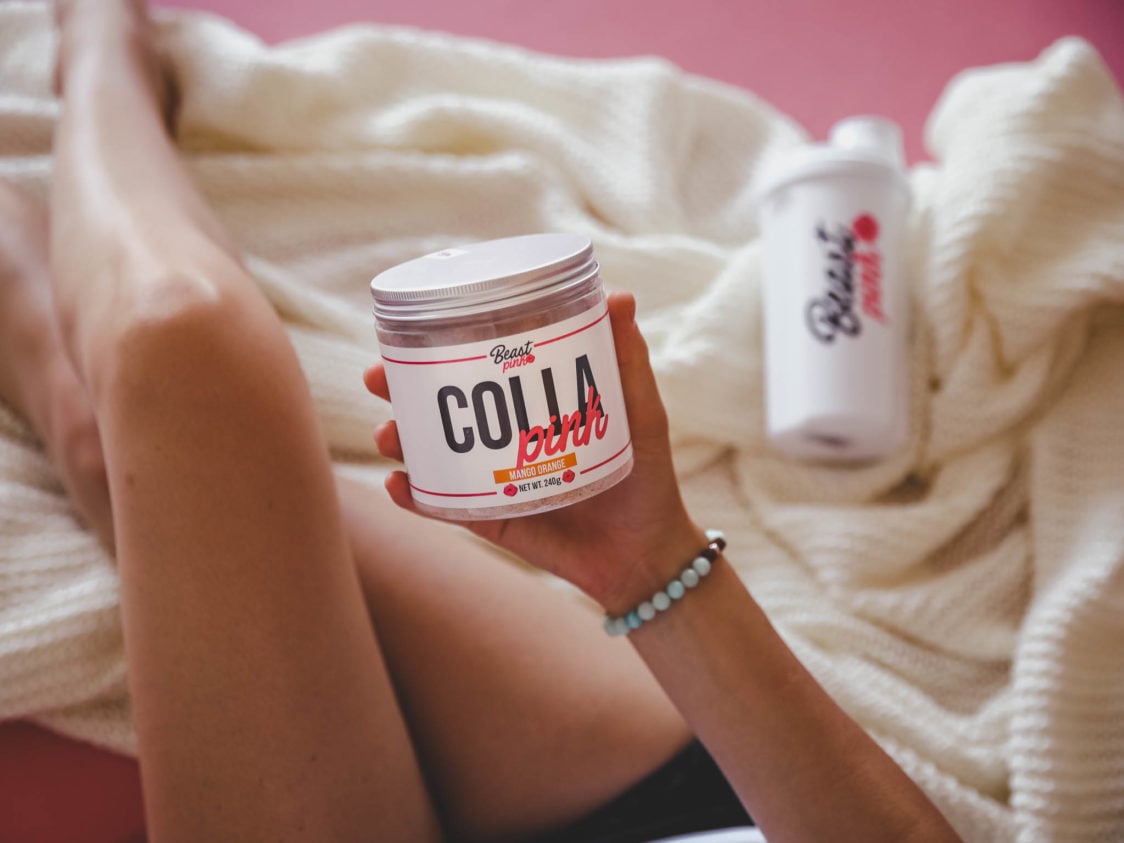
To make things more difficult, there is not just one type of collagen. There are even up to 16 types of collagen, which differ in structure and function. However, 80 to 90% of the human body consists mainly of type I, II and III collagen. Type I occurs mainly in the skin, tendons, ligaments, organs and bones. Type II is mainly found in cartilage and type III is found in skin, muscles and blood vessels. [1] [6]
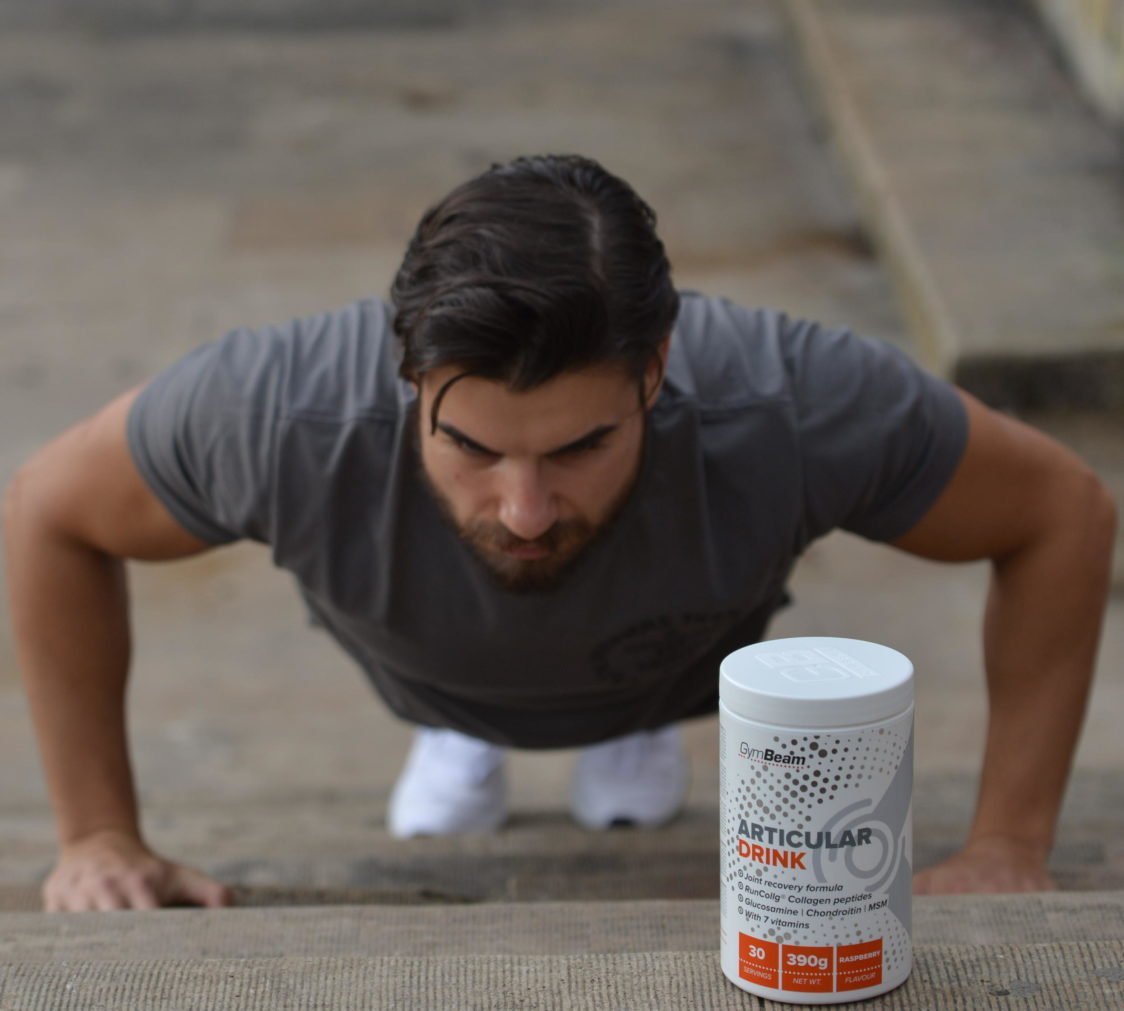
What are the benefits of collagen?
We have already said what collagen is and where exactly it is located. But what interests you more are probably its many benefits. [2]
- Improves skin health – Collagen slows down skin aging by moisturizing it, reducing wrinkles and improving its overall elasticity.
- Supports joint health – with excessive long-term physical activity and through the aging process, joint wear increases in humans. Collagen supplements can help restore or serve to prevent the destruction of cartilage in the joints.
- It helps to increase muscle mass – the muscles also consist of connective tissues, so it is not surprising that part of the protein in the muscles is also collagen.
- It prevents the loss of bone mass – collagen is found in large amounts in the bones, which keeps them strong and protects them from injury. As a person ages, he loses a high amount of collagen from his bones and develops an unpleasant problem – osteoporosis. Optimal collagen supplementation, or a combination of collagen and calcium, has been shown to be effective against bone thinning and in prevention against osteoporosis. [4]
- Promotes heart health – Some research has focused on the effects of collagen on promoting the health of the cardiovascular system. The use of collagen has been shown to reduce arterial stiffness and lower the levels of low-density lipoproteins (“bad” LDL cholesterol). However, to confirm these effects, this hypothesis needs to be studied further. [5]
For more information on the types, benefits, but also supplementation of collagen, we recommend you to read our comprehensive article How to choose the best collagen for healthy skin and joints ?.
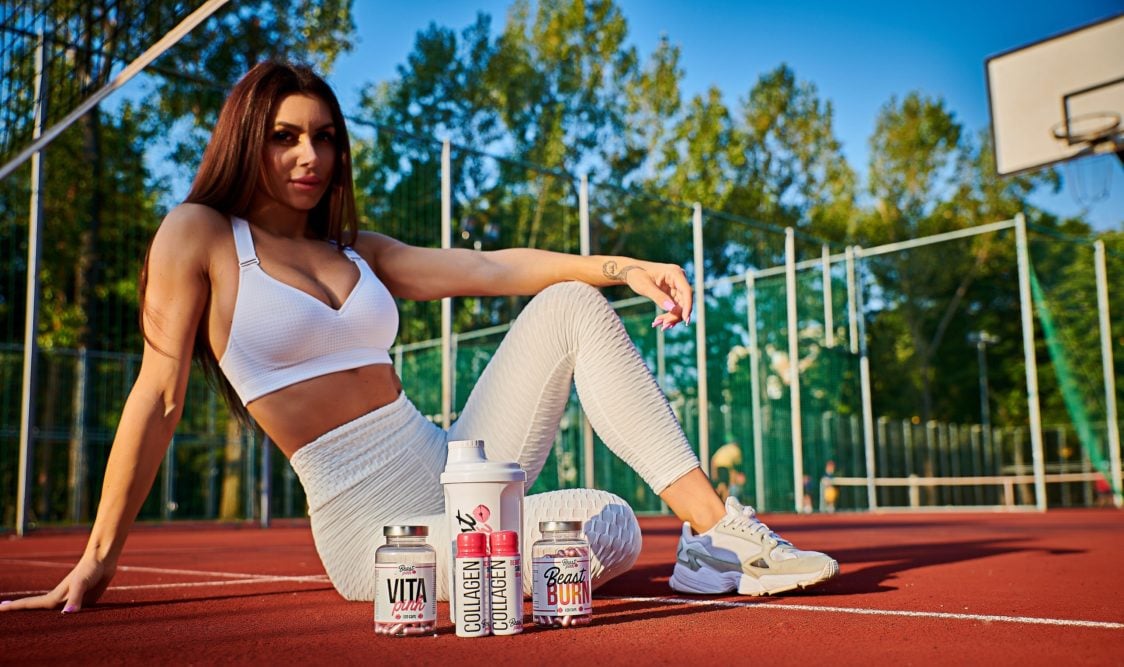
Risks affecting collagen loss
But why is it necessary to supplement collagen, even though the body can make it itself? Collagen levels in the human body decrease during life due to several factors, such as: [1] [6]
- age,
- lack of some vitamins and minerals,
- excessive sugar intake,
- excessive exposure to sunlight,
- autoimmune diseases,
- excessive stress,
- smoking.

How to take more collagen?
Fortunately, collagen can be taken in several ways, so you don’t have to worry about its low levels. All you have to do is simply choose the right foods or nutritional supplements!
You might be interested in these products:
The best food sources of collagen
Collagen itself can also be found in food. We guarantee you that it’s not only animal sources of food, but vegetarians and vegans will also find what they’re looking for. What are the best food sources of collagen? [10] [11]
- Fish – not only are they very tasty, they are also rich in amino acids that support collagen production. Fish skin is a particularly nutritious part. Have you ever wondered why is the skin of fish so smooth after removing the scales? This is because it contains a high concentration of type I collagen. If you ever eat salmon, consider not removing the skin from it.
- Red peppers – they are a rich source of vitamin C, which is key in the formation of collagen. Red pepper is essentially a ripe green pepper, and in general, the more ripe the pepper is, the more vitamin C it contains. That’s why red pepper is the right kind of vegetable to supplement with vitamin C.
- Tomatoes – especially sun-dried – also contain high levels of vitamin C needed to produce collagen. They also contain the antioxidant lycopene, which is known to protect the skin from sun damage and collagen breakdown.
- Bone broth – this is one of the oldest and most popular natural sources of collagen, the preparation of which is really simple. All you have to do is add beef, chicken or other animal bones to the pot and let them cook for a few hours.
- Berries – strawberries, blackberries, raspberries or blueberries are full of antioxidants, including vitamin C. They also contain ellagic acid, which protects the skin from UV radiation.
- Beef – a popular source of collagen, which contains a high amount of zinc, but is also extremely rich in the three amino acids that make up collagen – glycine, proline and hydroxyproline.
- Citrus fruits – lemon, orange, grapefruit or tangerines – these crops are one of the best sources of vitamin C.
- Eggs – if you want to support the production of collagen and increase its levels in the body, we recommend you to enjoy whole eggs. Egg yolks contain a type of collagen that is responsible for keeping hair strong and shiny. Egg whites, on the other hand, contain several amino acids needed for proper collagen production.
- Dark leafy vegetables – again a great example of foods high in vitamin C. In addition, if you enjoy kale, broccoli or spinach, you will also take the green color chlorophyll. It can increase procollagen levels (a collagen precursor).
- Legumes – Several types of legumes, such as chickpeas, are very rich in manganese, zinc or vitamin C, which promote collagen production.
- Oysters – are one of the best natural sources of copper, which helps to produce collagen in the body.
- Chicken meat and bones – like beef or fish, chicken is a valuable source of collagen as it contains a lot of connective tissue. There are also chicken bones, which can be used to prepare gelatin or broth. Chicken neck and cartilage are a particularly rich source.
- Garlic – it contains a high amount of sulfur, which helps prevent the breakdown of collagen.
- Cashew nuts – all nuts contain many beneficial substances, but cashew nuts are an extremely rich source of zinc and copper, which support the natural production of collagen.
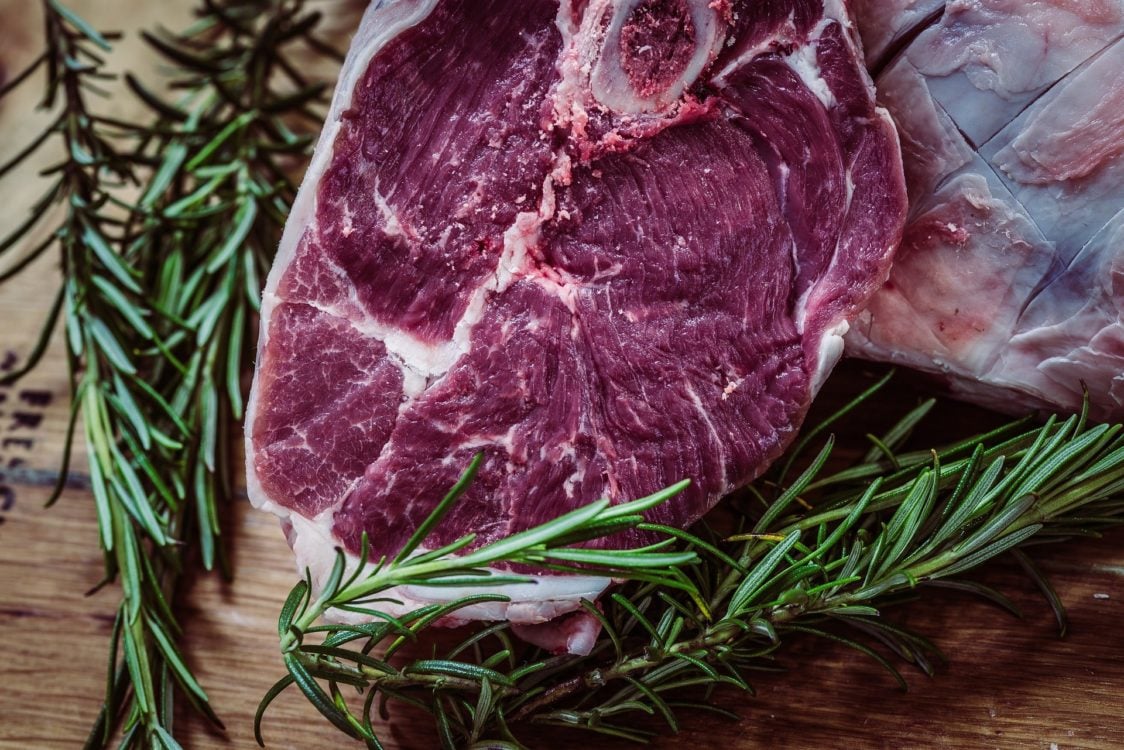
Vitamins and minerals that support the natural production of collagen
Some vitamins, minerals and other beneficial nutrients significantly help to improve the body’s natural production of collagen. In addition, when combined with collagen supplementation, they can also promote the natural production of collagen in the body. Which are they? [8] [9] [14]
Vitamin C
Vitamin C is one of the most sought-after vitamins, which our body cannot make on its own. It even needs it so much that it can absorb it and use it within a few hours of receiving it. It fulfills several important functions, including strengthening the immune and nervous systems, supporting bone and cartilage health, and according to several studies, it also plays an important role in skin protection. Vitamin C acts in the process of collagen production as an antioxidant that regulates the synthesis of collagen and elastin. In addition to these functions, it has another important one, and that is its necessary presence in the formation of procollagen. Then it undergoes a process of hydrolysis, which is necessary to form the final structure of collagen. Therefore, the intake of vitamin C is really crucial for collagen production. [15]
In addition to being found in many foods, such as citrus fruits and several fruits and vegetables, it is also available as a nutritional supplement. You can choose vitamin C in the form of tablets, effervescent tablets or powder. For the best possible participation of vitamin C for collagen production, nutritional supplements containing both components – vitamin C + collagen – are also available. If you are considering collagen supplementation, make sure that vitamin C is included in the composition. This will get the most out of it.
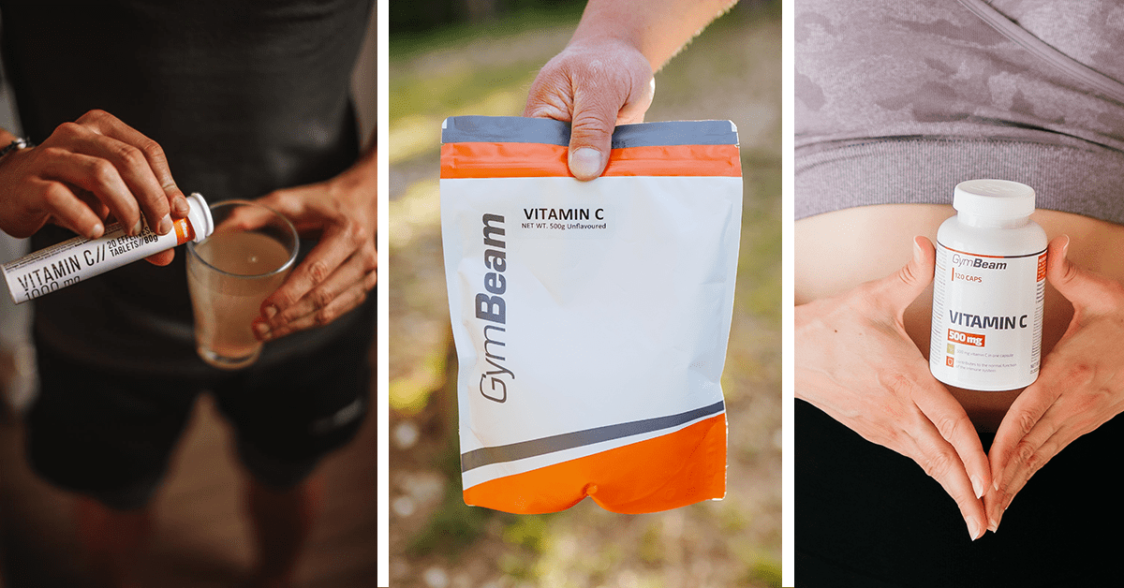
Zinc
This mineral is an essential trace element needed for bone formation, which contributes positively to many processes in the body, such as DNA synthesis or the promotion of fertility and proper reproductive function. However, zinc has been shown to have strong stimulatory effects to promote collagen production. The results of the study suggest that zinc may increase its osteogenic effect by stimulating cell proliferation, ALP activity and collagen synthesis in osteoblastic cells. Simply put, zinc has been shown to promote collagen production and help increase bone density. [12]
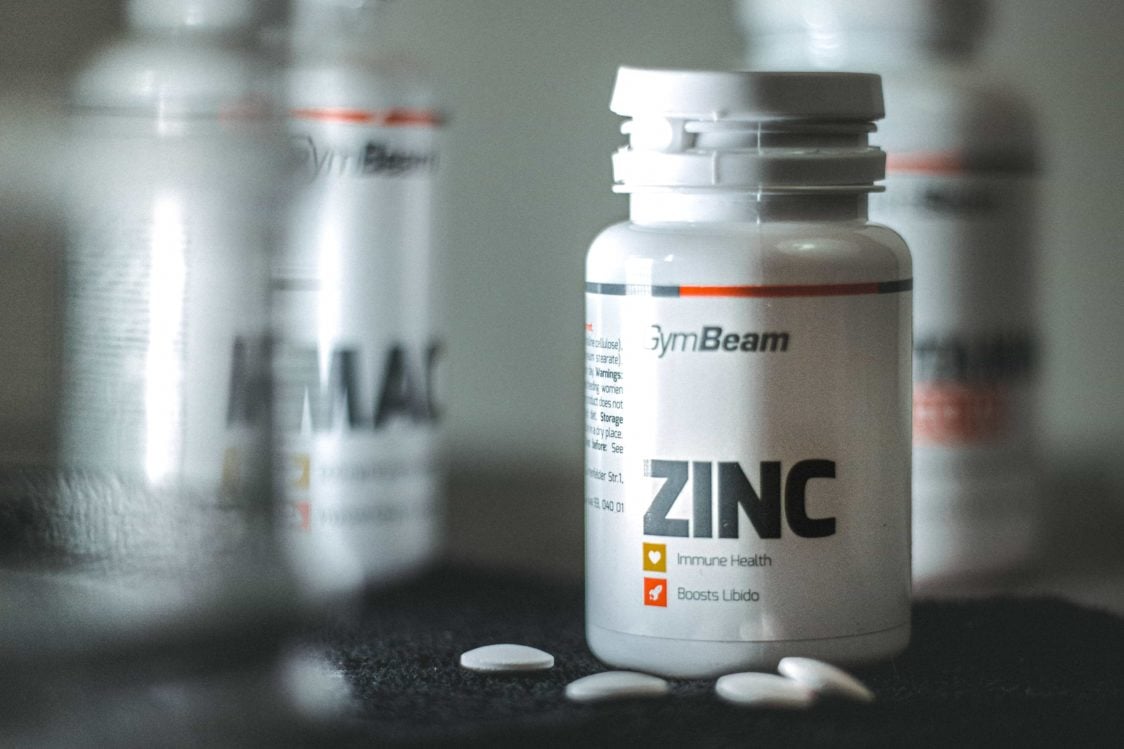
Copper
Another mineral that plays an important role in collagen formation. Copper activates an enzyme in the body called lysyl oxidase, which is needed to make collagen mature. A great way to get enough copper in the body is to supplement it, but you can also find it in beef liver, cashew nuts, oysters, crabs and sunflower seeds. [14] [17]
Manganese
Did you know that manganese is extremely important for maintaining the health of bones and connective tissues? It is therefore not surprising that its supplementation together with collagen will have positive effects for you. In addition, the collagen protein in the body contains the amino acid proline, which helps give the collagen fibers their shape and strength. It is manganese that activates the enzymes needed to make proline. According to experts, you should take from 1,8 to 2,3 mg of manganese per day. You can consume it as a separate nutritional supplement or as part of mineral complexes. However, you can also find it in brown rice, pecans and green tea. [14] [16]
Collagen supplementation
The fastest and most comfortable way to get more collagen is through nutritional supplements. The composition of the individual supplements varies, but they usually contain type I, II, III collagen, or their combination. However, you can find it on the market in three main forms: [6] [7]
- Hydrolyzed collagen – this is a collagen hydrolyzate that decomposes into smaller collagen peptides. These enter the body much more easily, are better absorbed into the blood, and can pass into the layer of skin called suede, which is directly responsible for the elasticity and strength of the skin. Therefore, if you want to firm and strengthen the skin, you should try hydrolyzed collagen or a supplement that contains it.
- Gelatin – it is a product of plant or most often animal origin, which is obtained by processing connective tissue. Animal-based gelatin is called aspic and is made from pork, beef, chicken and fish bones. These are heat treated and then filtered for collagen. Gelatin from plant sources, called agar or agarose, is made from seaweed, specifically a type of agar agar. Pectin, which is made from the peel of citrus fruits or even crushed apples, can also be included in this category of gelatine.
- Undenatured collagen II. type – it is a raw unprocessed type of collagen. This nutritional supplement is mainly used in healthy people who experience pain after exercise and in patients with osteoarthritis of the knee.
However, several studies have shown that hydrolyzed collagen supplementation seems to be the most effective. [7]

Collagen supplementation in vegetarians and vegans
Since collagen supplements come mostly from animals, they are not suitable for vegans or vegetarians. Fortunately, collagen can also be produced using genetically modified yeasts and bacteria, which are suitable for opponents of animal diets. [13]
Remember, collagen is lost from the body with age, and if you do not want to suffer from joint pain or loss of skin elasticity at a later age, you should consider taking it. Whether you choose collagen supplements or their food sources, you are guaranteed to do something beneficial for your health.
How do you supplement collagen levels? Share your tips in the comments and don’t forget to share the article.
[1] Cynthia Cobb, DNP, APRN – What is collagen, and why do people use it? – https://www.medicalnewstoday.com/articles/262881#uses
[2] Brianna Elliott, RD – Top 6 Benefits of Taking Collagen Supplements – https://www.healthline.com/nutrition/collagen-benefits
[3] Marlena Gauza-Włodarczyk, Leszek Kubisz, Dariusz Włodarczyk – Amino acid composition in determination of collagen origin and assessment of physical factors effects – https://www.sciencedirect.com/science/article/abs/pii/S0141813017315787
[4] Marcus L Elam, Sarah A Johnson, Shirin Hooshmand, Rafaela G Feresin, Mark E Payton, Jennifer Gu, Bahram H Arjmandi – A calcium-collagen chelate dietary supplement attenuates bone loss in postmenopausal women with osteopenia: a randomized controlled trial – https://pubmed.ncbi.nlm.nih.gov/25314004/
[5] Naohisa Tomosugi, Shoko Yamamoto, Masayoshi Takeuchi, Hideto Yonekura, Yasuhito Ishigaki, Noriaki Numata, Shogo Katsuda and Yasuo Sakai – Effect of Collagen Tripeptide on Atherosclerosis in Healthy Humans – https://www.ncbi.nlm.nih.gov/pmc/articles/PMC5429168/
[6] Kayla Robinson, BKin, RHN – A Look at Collagen: Benefits and Best Collagen Supplements – https://fullscript.com/blog/collagen
[7] Makayla Meixner MS, RDN – Do Collagen Supplements Work? – https://www.healthline.com/nutrition/do-collagen-supplements-work#types
[8] Ben Creicos – 6 easy ways to add collagen to your diet – https://www.bodybuilding.com/content/6-easy-ways-to-add-collagen-to-your-diet.html
[9] Cynthia Cobb, DNP, APRN – Ways to get healthier looking skin by boosting collagen levels – https://www.medicalnewstoday.com/articles/317151#Ways-to-boost-collagen
[10] Katherine Marengo LDN, R.D. – 13 Foods That Help Your Body Produce Collagen – https://www.healthline.com/health/beauty-skin-care/collagen-food-boost
[11] Adele jackson-Gibson – 12 Collagen-Rich Foods to Eat for Healthy, Radiant Skin – https://www.goodhousekeeping.com/health/diet-nutrition/g29486608/collagen-rich-foods/
[12] Hyun-Ju Seo, Young-Eun Cho, Taewan Kim, Hong-In Shin and In-Sook Kwun – Zinc may increase bone formation through stimulating cell proliferation, alkaline phosphatase activity and collagen synthesis in osteoblastic MC3T3-E1 cells – https://www.ncbi.nlm.nih.gov/pmc/articles/PMC2981717/
[13] Katherine Marengo LDN, R.D. – Here’s What You Need to Know About Vegan Collagen – https://www.healthline.com/health/food-nutrition/vegan-collagen
[14] Sylvie Tremblay – What Minerals Aid in Collagen Production – https://healthyeating.sfgate.com/minerals-aid-collagen-production-9485.html
[15] Alexandra Engler – Why Vitamin C Is Critical To Have In Collagen Supplements – https://www.mindbodygreen.com/articles/is-your-collagen-supplement-missing-this-the-extra-ingredient-it-needs
[16] Amy Goodson, MS, RD, CSSD, LD – 10 Evidence-Based Benefits of Manganese – https://www.healthline.com/nutrition/manganese-benefits
[17] E D Harris, J K Rayton, J E Balthrop, R A DiSilvestro, M Garcia-de-Quevedo – Copper and the synthesis of elastin and collagen – https://pubmed.ncbi.nlm.nih.gov/6110524/

